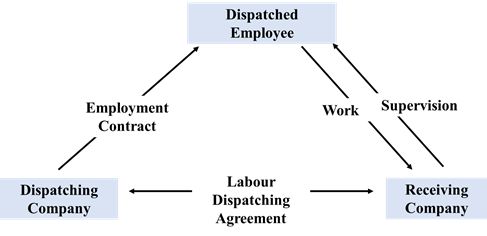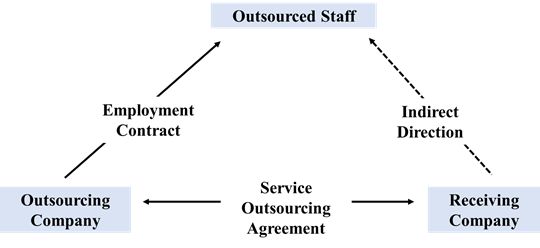I Development Status of Labour Outsourcing
The World Bank pointed out in its 2019 World Development Report that the future labour force market would turn to a market of odd jobs instead of work. In other words, the adoption of flexible types of work will expand further in a way that may replace tradition type of employment to some extent. At this stage, based on different understanding of "flexible", the flexible types of work in China include non-full time job which is flexible in terms of working hours, labour dispatching which is flexible in terms of form of employment, and labour outsourcing which is flexible in terms of the manner of service provided.
The outsourcing type of work, which is represented by labour outsourcing, has the following features: there are no special restriction or prohibition imposed by the law; no employment will be established between the receiving party and the outsourced workers, and their relationship shall not be governed by labour-related legislation; the outsourcing party is not required of special qualifications, except for special industries. Such type of work has been adopted by quite a lot enterprises.
Recently, Zhejiang Provincial Human Resources and Social Security Department promulgated the Guiding Opinions on the Optimization of Employment of New Types, which, taking into account the prosperity of such new types of economy as e-commerce, online car hailing, online food ordering, and delivery and logistics, allow employers to use diverse types of work. The Opinions provide that "with respect to workers working under new types of work and having no employment with enterprises in new types of industries, such enterprises may enter into civil agreements with such workers (such as labour outsourcing agreement, franchising agreement, and agreement for other types of cooperation), to define reasonably the rights and obligations of the enterprises, workers and cooperators."
As labour outsourcing has been adopted by ever increasing enterprises, there emerged certain problems, such as loose labour outsourcing management, and taking use of labour outsourcing for avoidance of certain labour responsibilities, which has posed large legal risk to enterprises. This article will analyze the legal risks of labour outsourcing by illustrating some real cases and offer suggestions to avoid such risks.
II Difference Between Labour Outsourcing and Labour Dispatching
On 1 July 2013, the Labour Contract Law of the PRC (Revision) came in force. This Revision has set strict provisions and restriction on the adoption of labour dispatching, to avoid abuse of labour dispatching, failure to effectively protect the legitimate rights and interest of dispatched personnel, and same work with different pay, etc. Whereas the Revision sets forth new provisions on such issues as labour dispatching positions, proportion of dispatched employees, same work with same pay, and legal responsibilities, etc., numerous enterprises using dispatched employees have to be faced with increased cost and legal risk.
Based on the above, service outsourcing has attracted increasing attention. Many human resources management companies, with labour dispatching as their main business, have developed or strengthened their outsourcing service, and recommended actively enterprises with extensive use of dispatched employees to adopt service outsourcing as the optimal replacement for labour dispatching. Nowadays, quite a number of enterprises have replaced labour dispatching with labour outsourcing.
To prevent enterprises from evading from the restriction imposed by law on labour dispatching by way of adopting labour outsourcing, Article 27 of the Interim Provisions on Labour Dispatching promulgated in 2014 by the Ministry of Human Resources and Social Security expressly provides that "where employers use outsourced workers in the form of labour dispatching and in the name of contracting or outsourcing, these Provisions shall apply." However, these Provisions haven't offered a clear definition of "labour outsourcing under the cover of labour dispatching", and there are no unified judging opinions or standards in judicial practice on the same either.
You may find below the analysis and comparison of the two types of work.
1. Labour Dispatching

Labour dispatching refers to the type of work where the dispatching company and the dispatched employee enter into an employment contract, and, in accordance with the agreement it signed with the receiving company, the dispatching company sends the dispatched employee to the receiving company to work. In such triple relationship, the dispatching company and the dispatched employee enter into employment at law; the dispatching company and the receiving company enter into civil relationship and define their rights and obligations by concluding a labour dispatching agreement, and the receiving company and the dispatched employee enter into labour service relationship where the dispatched employee provides labour service directly to the receiving company and receives work assignment and supervision directly from the receiving company.
2. Labour Outsourcing

From the perspective of enterprise management, labour outsourcing refers to the type of work where enterprises have certain work finished by the labour force provided by external service provider, so as to lower cost, promote efficiency and enhance competitiveness. In the triple relationship, the outsourcing company and the outsourced workers enter into employment or other relationship of the same nature; the outsourcing company and the receiving company enter into civil contractual relationship; the receiving company and the outsourced workers have no direct legal relationship, i.e. the receiving company usually give work direction and requirements to the outsourced workers indirectly through the outsourcing company.
3. Basic Difference
Based on the above analysis, with respect to labour dispatching, it is the process of labour that enterprises manage; the receiving company gives direct supervision and work assignments to the dispatched employees; the dispatching company doesn't participate in the process of labour after dispatching the employees. For labour outsourcing, it is the work result that enterprises manage; outsourced staff provide labour to the outsourcing company; the receiving company usually doesn't participate in the management of labour process or even need to concern about or interfere the quality or quantity of the outsourced staff, instead, it needs only to exercise its rights and perform its obligations according to the labour outsourcing agreement signed with the outsourcing company and based on the work completed.
The basic difference between labour outsourcing and labour dispatching can be summarized as follows:
| Labour Outsourcing | Labour Dispatching | |
| Legal relationship with the contracting party | Contract of hired work, service contract, technology development contract, and commission contract. | Labour dispatching contract |
| Relationship with workers | No direct relationship | Labour service relationship |
| Managerial powers over outsourced staff | No direct management | Direct management |
| Business applied | Non-core business | Some core business |
| External damages to be compensated by | Outsourcing company | Receiving company |
| Risk of labour dispute to be borne by | Outsourcing company | Receiving company (jointly and severally) |
| Evaluation criteria for work performance | Outsourced service completed | Provision of dispatched employees according to the agreement |
III Analysis on Common Legal Risks of Labour Outsourcing
In practice, if the receiving company and the outsourcing company enter into a written agreement, defining their relationship as outsourcing, and the party concluding employment contract with the outsourced workers, paying the outsourced workers' wage, and contributing their social insurance premiums is not the receiving company, the receiving company and the outsourced workers usually will not be deemed as having entered into factual employment.
In Lv Zhongqun vs. Johnson & Johnson (China) Co., Ltd, Second Instance, Labour Dispute ([2018] Jing 02 Min Zhong No. 5439), the court held that "Lv Zhongqun and Always company entered into an employment contract, according to which Always shall pay Lv's salary, and Always (Beijng) shall pay for Lv's social insurance premiums on behalf of Always. It is according to the service outsourcing agreement between Always and Johnson & Johnson that Lv sold Johnson & Johnson products and accepted Johnson & Johnson's business supervision, therefore, Lv cannot prove that Lv had established employment relationship with Johnson & Johnson." In Cao Jie vs. China Telecom Stock Limited Company Beijing Branch, Second Instance, Labour Dispute ([2016] Jing 01 Min Zhong No. 2093), the court believed that "Cao Jie and Xinyuan company entered into an employment contract, and during the term thereof, Cao's salary and social insurance premiums were paid by Xinyuan company, therefore, it's obvious that Cao's employer is not China Telecom."
However, it came to our attention that in some cases, the court tends to review the way the outsourcing company and the receiving company settle accounts and manage the outsourced workers, etc., based on which the court will affirm whether the receiving company and the outsourced workers had entered into labour dispatching relationship or even factual employment.
1. Labour outsourcing is affirmed as labour dispatching.
As described above, the Interim Provisions on Labour Dispatching, which though has prohibited "labour outsourcing under the cover of labour dispatching" has no clear definition of such covered outsourcing. We studied relevant cases and found that judicial authorities tend to evaluate whether a type of work is of the nature of labour dispatching or labour outsourcing in the following aspects:
(1) Payment terms
Payment terms can indirectly reflect the subject matter of a contract. Under a labour outsourcing service agreement, the subject matter should be the workload completed and payment should be made as per the completed workload. If the receiving company and the outsourcing company settled accounts as per number of staff instead of workload, it is risky that the subject matter of the contract will be deemed as labour force instead of work result, and that the labour outsourcing will thus be affirmed as labour dispatching. In Fan Wenbin vs. CNPC Great Wall Drilling Company, Bejing Zhongqi Labour Service Co., Ltd, Labour Dispute ([2017] Jing 0102 Min Chu No. 8163), the court held that "Fan Wenbin accepted work management from CNPC and CNPC and Zhongqi company settled accounts as per number of workers, which as a whole doesn't fit the features of a service outsourcing agreement. Therefore, the court hereby affirms that despite the service outsourcing agreement between CNPC and Zhongqi, the relationship among the three parties is labour dispatching in nature."
(2) Way of staff management
If the receiving company conducts direct management over the outsourced workers, such as management and requirement on both the work result and attendance of the outsourced workers, it is risky that the labour outsourcing will be affirmed as labour dispatching if the dispatched workers request so, even if the outsourced workers and the outsourcing company have entered into written employment contracts. In Lidu Hotel Co., Ltd. vs. Xu Guangming, Second Instance, Labour Dispute ([2014] San Zhong Min Zhong Zi No. 15106), the court held that "firstly, Lidu Hotel, Huaao company and Guowanpiaopen company signed a Staff Agreement, and Xu, among others, got interviewed by and provided work to Lidu Hotel directly. Secondly, Xu's attendance records needed to be submitted to Lidu Hotel and signed by Lidu Hotel's staff, which shows that Lidu Hotel had requirements and management over both the work result and the attendance of Xu. Lastly, Lidu Hotel kept the original or duplicate employment contracts and wage payment records of certain outsourced staff. These above facts and statement of the parties all indicate that the triple relationship between Lidu Hotel, Huaao company and Guowanpiaopen company is more of the nature of labour dispatching than of labour outsourcing."
It should be noted that under labour outsourcing, some courts believe that the receiving company may have work management over the outsourced staff to some extent. In Bai Juanjuan vs. VMware Information Technology (China) Co., Ltd. Shanghai Branch and Beijing Fesco Adecco Human Resources Service Shanghai Co., Ltd, Second Instance, Labour Dispute ([2017] Hu 02 Min Zhong No. 2883), the court held that "Bai Juanjuan provided on-site work. It makes sense that VMware Shanghai, as service receiving company, exercised certain managerial powers on Bai and required Bai to report her attendance at the work place to the staff of VMware out of the need for product and service quality control and work discipline."
2. The receiving company and the outsourced workers are affirmed to have factual employment relationship.
In some cases, the receiving company and the outsourced workers are directly affirmed to have factual employment relationship.
- If the receiving company conducts direct labour management on the outsourced workers, such as direct payment of remuneration and direct work management, and if the outsourced workers request to confirm the existence of factual employment relationship with the receiving company, the risk that the factual employment relationship will be affirmed is relatively high. In Beijing Yongshangxin Cleaning Service Co., Ltd. vs. Zhang Chunmei, Second Instance, Labour Dispute ([2018] Jing 03 Min Zhong No. 7089), the receiving company chopped its company seal on the Position Adjustment Notice it sent to the outsourced worker, and paid the salary of such work directly; the court affirmed the factual employment between the receiving company and the outsourced worker.
- If the receiving company hasn't obtained labour dispatching qualification or didn't include labour outsourcing in its business scope, the risk of factual employment will further expand. See Meilunmei (Beijing) International Trade Co., Ltd. vs. Beijing Jinpairuisi Decoration Design Co., Ltd, etc., Second Instance, Labour Dispute ([2018] Jing 03 Min Zhong No. 9769).
3. It is inevitable that the receiving company gets involved in arbitration and litigation.
In practice, although the receiving company concluded no employment with the outsourced staff, in case of labour dispute between the outsourcing company and the outsourced staff, the outsourced staff will commonly choose to initiate labour arbitration and litigation against both the outsourcing company and the receiving company. Even if ultimately the labour arbitration commission and court affirms that there is no employment relationship between the receiving company and the outsourced staff, the receiving company has to bear the cost of time and attorney's fee.
We have searched relevant cases by using the key word "outsourcing" with the cause of action "labour dispute" in the year "2019" within the territory of "Beijing" and got 55 target labour disputes regarding labour outsourcing. Among the 55 labour disputes, 28 are of the first instance, and 27 of the second. In all such 55 labour disputes, the receiving company participated in the litigation as a litigant.
IV Suggestions for the Receiving Company
1. Adopt labour outsourcing service reasonably
It is essential that labour outsourcing is adopted reasonably. If the outsourced work is indeed evaluated as per the work completed, and the receiving company doesn't need to give direct direction, supervision or work assignment to the outsourced workers, or even doesn't need to participate much in the outsourced work, there should be no risk that the receiving company and the outsourced workers be affirmed to have entered labour dispatching relationship. If the outsourced work is not evaluated solely based on the work completed, and the receiving company has to give direct direction, supervision and work assignment to the outsourced workers, then, even if the receiving company has signed a service outsourcing agreement with the outsourcing company, there is risk that the court will affirm the labour dispatching relationship, or even worse, the factual employment, between the receiving company and the outsourced workers.
2. Select outsourcing company cautiously
When selecting outsourcing company, the following principles are suggested to be taken into account:
- In case of national or local special qualification required, select from the outsourcing companies with such qualification;
- In case of no such qualification requirements, select from the professional non-human-resources companies of relatively large scale engaging in related outsourcing business;
- If no such professional company or no company of large scale or with proper management, select from the human resources service companies of large scale and good reputation which engage in service outsourcing; and
- The outsourcing company should have good internal management, conclude written employment contract with the employees, pay for the employees' social insurance premiums, and directly pay the outsourced workers labour remuneration and benefits.
3. Review the service contract carefully
In the signing of a service outsourcing agreement, the receiving company should try to avoid leaving any clause in the agreement that seems similar to or may be misunderstood as labour dispatching. For example, in payment term clauses, the date and amount of payment should be set as per the work completed, instead of the quantity and working hours of outsourced workers; in clauses regarding the daily management of outsourced workers, clauses providing that the receiving company will directly manage outsourced workers or that the outsourced workers should abide by the human resources administration rules of the receiving company (such as attendance, reward and punishment, and performance evaluation rules) should be avoided.
The content of this article is intended to provide a general guide to the subject matter. Specialist advice should be sought about your specific circumstances.


